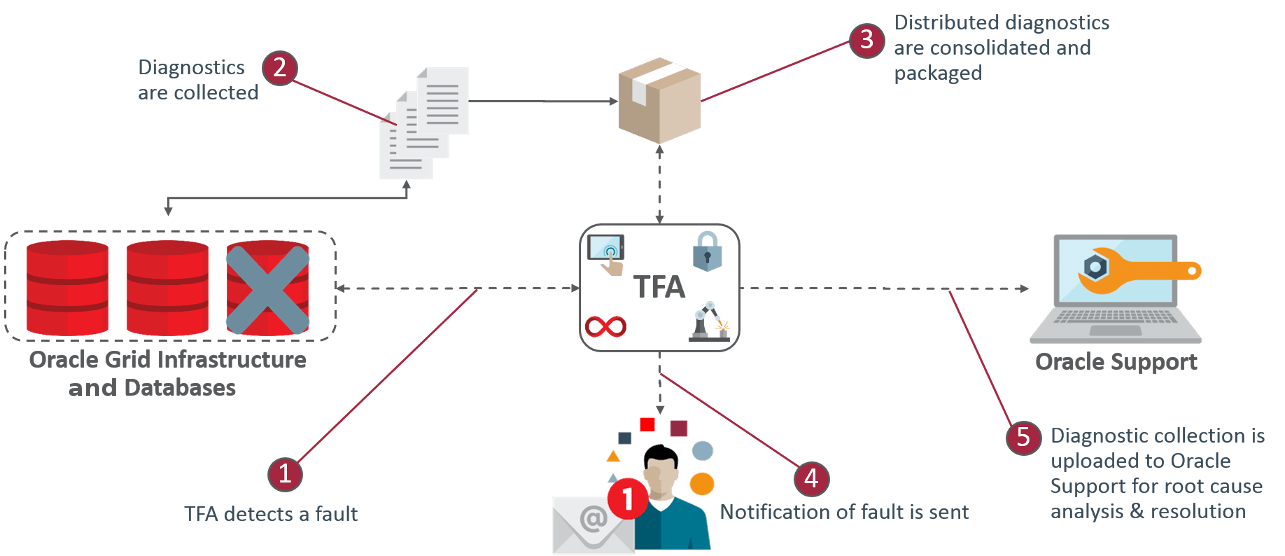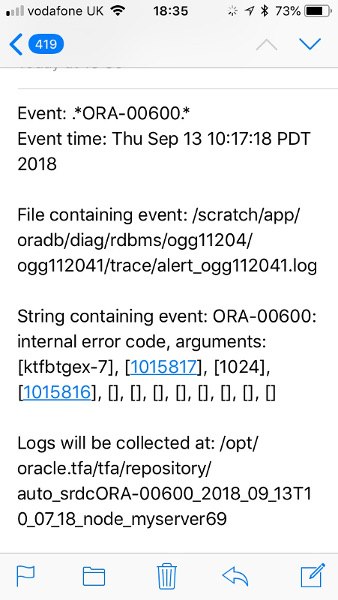4.2 Using Automatic Diagnostic Collections
Oracle Trace File Analyzer monitors your logs for significant problems, such
as internal errors like ORA-00600, or node evictions.
- Collecting Diagnostics Automatically
This section explains automatic diagnostic collection concepts. - Configuring Email Notification Details
Configure Oracle Trace File Analyzer to send an email to the registered email address after an automatic collection completes. - Collecting Problems Detected by Oracle Cluster Health Advisor
Configure Oracle Cluster Health Advisor to automatically collect diagnostics for abnormal events, and send email notifications. - Sanitizing Sensitive Information in Oracle Trace File Analyzer Collections
After collecting copies of diagnostic data, Oracle Trace File Analyzer uses Adaptive Classification and Redaction (ACR) to sanitize sensitive data in the collections. - Flood Control for Similar Issues
Flood control mechanism helps you save resource through fewer repeat collections for similar issues.
Parent topic: Collect Diagnostic Data
4.2.1 Collecting Diagnostics Automatically
This section explains automatic diagnostic collection concepts.
If Oracle Trace File Analyzer detects any problems, then it performs the following actions:
-
Runs necessary diagnostics and collects all relevant log data at the time of a problem
-
Trims log files to collect only what is necessary for diagnosis
-
Collects and packages all trimmed diagnostics from all nodes in the cluster, consolidating everything on a single node
-
Stores diagnostic collections in the Oracle Trace File Analyzer repository
-
Sends you email notification of the problem and details of diagnostic collection that is ready for upload to Oracle Support
Figure 4-2 Automatic Diagnostic Collections

Description of "Figure 4-2 Automatic Diagnostic Collections"
Oracle Trace File Analyzer has a mechanism that prevents repeat errors from overwhelming your system with excessive, automatic collections.
Identifying an event triggers the start point for a collection and five minutes later Oracle Trace File Analyzer starts collecting diagnostic data. Starting five minutes later enables Oracle Trace File Analyzer to capture other relevant events in one operation. If events are still occurring after five minutes, then diagnostic collection continues to wait. Oracle Trace File Analyzer waits for 30 seconds with no events occurring up to an additional five minutes.
If events continue after 10 minutes, then Oracle Trace File Analyzer continues to perform diagnostic collection.
After completing the diagnostic collections, Oracle Trace File Analyzer sends email notifications that include the collection location to the designated recipients.
If your environment can make a connection to oracle.com, then you can use Oracle Trace File Analyzer to upload the collection to a Service Request.
$ tfactl set autodiagcollect=ON|OFFAutomatic collections are ON by default.
Table 4-3 Log Entries that Trigger Automatic collection
| String Pattern | Log Monitored |
|---|---|
|
System State dumped |
Alert Log - Oracle Database Alert Log - Oracle Database/Oracle ASM Alert Log - Oracle Database/Oracle ASM Proxy Alert Log - Oracle Database |
|
|
Alert Log - Oracle Clusterware |
Additionally, when Oracle Cluster Health Advisor detects a problem event, Oracle Trace File Analyzer automatically triggers the relevant diagnostic collection.
Parent topic: Using Automatic Diagnostic Collections
4.2.2 Configuring Email Notification Details
Configure Oracle Trace File Analyzer to send an email to the registered email address after an automatic collection completes.
To configure email notification details:
Parent topic: Using Automatic Diagnostic Collections
4.2.3 Collecting Problems Detected by Oracle Cluster Health Advisor
Configure Oracle Cluster Health Advisor to automatically collect diagnostics for abnormal events, and send email notifications.
Parent topic: Using Automatic Diagnostic Collections
4.2.4 Sanitizing Sensitive Information in Oracle Trace File Analyzer Collections
After collecting copies of diagnostic data, Oracle Trace File Analyzer uses Adaptive Classification and Redaction (ACR) to sanitize sensitive data in the collections.
Note:
Starting with Oracle Autonomous Health Framework 24.1, the Oracle Trace File Analyzer masking feature is deprecated, and can be desupported in a future release.tfactl set redact=mask|sanitize|nonemask: blocks out the sensitive data in all
collections, for example, replaces myhost1 with
*******
sanitize: replaces the sensitive data in all
collections with random characters, for example, replaces myhost1 with orzhmv1
none (default): does not mask or sanitize sensitive
data in collections
You can use the -sanitize and -mask
options with the diagcollect command to sanitize or mask
sensitive data in a specific collection.
To mask sensitive data:
Parent topic: Using Automatic Diagnostic Collections
4.2.5 Flood Control for Similar Issues
Flood control mechanism helps you save resource through fewer repeat collections for similar issues.
- Enable or disable flood control.
- How many times to collect for an event.
- Pause flood control.
The flood control data is stored in Berkeley Database and persists across Oracle Trace File Analyzer restarts.
Example 4-1 Flood Control Examples
# tfactl get floodcontrol
.----------------------------------------.
| testhost |
+--------------------------------+-------+
| Configuration Parameter | Value |
+--------------------------------+-------+
| Flood Control ( floodcontrol ) | ON |
'--------------------------------+-------'# tfactl get fc.limit
.------------------------------------------------.
| testhost |
+----------------------------------------+-------+
| Configuration Parameter | Value |
+----------------------------------------+-------+
| Flood Control Limit Count ( fc.limit ) | 3 |
'----------------------------------------+-------'# tfactl get fc.limittime
.-------------------------------------------------------------.
| testhost |
+-----------------------------------------------------+-------+
| Configuration Parameter | Value |
+-----------------------------------------------------+-------+
| Flood Control Limit Time (minutes) ( fc.limitTime ) | 60 |
'-----------------------------------------------------+-------'# tfactl get fc.pausetime
.-------------------------------------------------------------.
| testhost |
+-----------------------------------------------------+-------+
| Configuration Parameter | Value |
+-----------------------------------------------------+-------+
| Flood Control Pause Time (minutes) ( fc.pauseTime ) | 120 |
'-----------------------------------------------------+-------'# tfactl floodcontrol print
.----------------------------------------------------------------------------------------------------------------------------------------------------------.
| Event | Count | Start Date | Last Date | Limit | Limit Time | Pause Time | Coll Count | Skip Count |
+------------------------+-------+------------------------------+------------------------------+-------+------------+------------+------------+------------+
| orcl:ORA-00600:user1 | 1 | Thu May 21 09:18:56 UTC 2020 | Thu May 21 09:18:56 UTC 2020 | 3 | 60 | 120 | 1 | 0 |
+------------------------+-------+------------------------------+------------------------------+-------+------------+------------+------------+------------+
| orcl:ORA-00600:user2 | 1 | Thu May 21 09:18:25 UTC 2020 | Thu May 21 09:18:25 UTC 2020 | 3 | 60 | 120 | 4 | 2 |
'------------------------+-------+------------------------------+------------------------------+-------+------------+------------+------------+------------'
# tfactl floodcontrol clear -event orcl:ORA-00600:user1
Successfully cleared Event orcl:ORA-00600:user1
# tfactl floodcontrol print
.---------------------------------------------------------------------------------------------------------------------.
| Event | Count | Start Date | Last Date | Limit | Limit Time | Pause Time | Coll Count | Skip Count |
+------------------------+-------+------------+-----------+-------+------------+------------+------------+------------+
| orcl:ORA-00600:user1 | 0 | null | null | 3 | 60 | 120 | 3 | 2 |
'------------------------+-------+------------+-----------+-------+------------+------------+------------+------------'# tfactl floodcontrol update -event orcl:ORA-00600:user1 -limit 10 -limittime 90 -pausetime 180
Successfully updated Flood Control Event
# tfactl floodcontrol print -event orcl:ORA-00600:user1
.----------------------------------------------------------------------------------------------------------------------------------------------------------.
| Event | Count | Start Date | Last Date | Limit | Limit Time | Pause Time | Coll Count | Skip Count |
+------------------------+-------+------------------------------+------------------------------+-------+------------+------------+------------+------------+
| orcl:ORA-00600:user1 | 1 | Thu May 21 09:18:25 UTC 2020 | Thu May 21 09:18:25 UTC 2020 | 10 | 90 | 180 | 4 | 2 |
'------------------------+-------+------------------------------+------------------------------+-------+------------+------------+------------+------------'Related Topics
Parent topic: Using Automatic Diagnostic Collections
